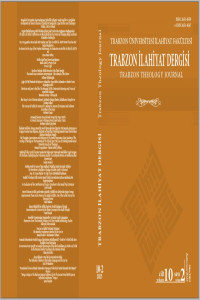Modern Tefsirde Ahlâk Meselesi - İbn Âşûr Örneği
The Moral Issue in Modern Interpretation - The Example of Ibn Ashur
Author(s): Gülnur KülünkoğluSubject(s): Ethics / Practical Philosophy, Islam studies, Contemporary Islamic Thought, Qur’anic studies
Published by: Karadeniz Teknik Üniversites - İlahiyat Fakültesi
Keywords: Tafsir; Quran; İbn Ashur; Islah; Morality;
Summary/Abstract: The issue of morality in Islamic thought has been discussed in many branches of disciplines with its various dimensions. The fact that the Qur'an, which is the main source of Islam, includes morality as a subject and aim has a great share in the favor shown to the subject of morality. Morality, which is primarily one of the subjects of the Quran, is among the purposes of the Quran for the betterment of human beings. With the modernization, as in many other fields, a moral vacuum has emerged with the loss of the value of the constants. For this reason, the emphasis on Islamic morality has increased and the works on this subject have increased. Especially the ıslah movements see the solution of the problems that arise in the modern period as possible with both moral and political reform. This study deals with Ibn Ashur's approach to verses that contain moral aspects. Ibn Âşûr, one of the most important commentators of the modern period, stands out among his contemporaries with his contribution to the issue of maqasid and the idea of ıslah and his ideas are mostly studied in the field of law. It is seen that there is not enough work on the moral approach of the interpreter that forms the basis of law. The aim of the study is to clarify the relationship between the concepts of reason, ftra, ıslah and corruption with morality through the commentator's approach to verses with moral content. In the final analysis, it is seen that the commentator's views on morality are not independent of the idea of ıslah, and the gradualism of the commentator's idea of ıslah, which spreads from the individual to the society, is reflected in his interpretation of moral. Ibn Ashur drew attention to the functionality of universal principles in his comments on morality. In this context, in her thought, kullî principles such as justice and ihsân are included under the basic principle of being moral. Cuz’î moral principles are interpreted under kullî principles. In the study, the commentator's comments within the scope of the relevant verses were determined, the obtained data were analyzed and the commentator's approach to the issue of morality was revealed. His views on the guidance of kullî principles and his hierarchical approach to morality was analyzed within the framework of the infaq example.
Journal: Trabzon İlahiyat Dergisi
- Issue Year: 10/2023
- Issue No: 2
- Page Range: 87-109
- Page Count: 23
- Language: Turkish

